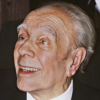Jorge Luis Borges

Jorge Luis Borges
Jorge Francisco Isidoro Luis Borges KBE; 24 August 1899 – 14 June 1986), was an Argentine short-story writer, essayist, poet and translator, and a key figure in Spanish-language literature. His best-known books, Ficcionesand El Aleph, published in the 1940s, are compilations of short stories interconnected by common themes, including dreams, labyrinths, libraries, mirrors, fictional writers, philosophy, and religion...
NationalityArgentinian
ProfessionPoet
Date of Birth24 August 1899
country sunset firefly
I thought that a man can be an enemy of other men, of the moments of other men, but not of a country: not of fireflies, words, gardens, streams of water, sunsets.
rose may eternity
He thought that the rose was to be found in its own eternity and not in his words; and that we may mention or allude to a thing, but not express it.
sea two sailing
It also occurred to him that throughout history, humankind has told two stories: the story of a lost ship sailing the Mediterranean seas in quest of a beloved isle, and the story of a god who allows himself to be crucified on Golgotha.
mean garden hands
It means much to have loved, to have been happy, to have laid my hand on the living Garden, even for a day.
art theology humans
God must not engage in theology. The writer must not destroy by human reasonings the faith that art requires of us.
book past thinking
I can’t talk about my books. I have written them and tried to forget them. I have written once, and readers have read me many times, no? I try to think of what I wrote, it’s very unhealthy to think about the past, the case of elegies is very sad, as much as the case of complaints.
art individual concrete
Art always opts for the individual, the concrete; art is not Platonic.
writing causality problem
The central problem of novel-writing is causality.
horse stars men
A man sets out to draw the world. As the years go by, he peoples a space with images of provinces, kingdoms, mountains, bays, ships, islands, fishes, rooms, instruments, stars, horses, and individuals. A short time before he dies, he discovers that the patient labyrinth of lines traces the lineaments of his own face.
past vocabulary facts
In the critic's vocabulary, the word "precursor" is indispensable, but it should be cleansed of all connotations of polemic or rivalry. The fact is that every writer creates his own precursors. His work modifies our conception of the past, as it will modify the future." -- Essay: "Kafka and his Precursors
men garden humanity
Whatever one man does, it is as if all men did it. For that reason, it is not unfair that one disobedience in a garden should contaminate all humanity; for that reason it is not unjust that the crucifixion of a single Jew should be sufficient to save it.
book night tears
Let neither tear nor reproach besmirch this declaration of the mastery of God who, with magnificent irony, granted me both the gift of books and the night.
memories book axes
A book is more than a verbal structure or series of verbal structures; it is the dialogue it establishes with its reader and the intonation it imposes upon his voice and the changing and durable images it leaves in his memory. A book is not an isolated being: it is a relationship, an axis of innumerable relationships.
different may metaphor
It may be that universal history is the history of the different intonations given a handful of metaphors.